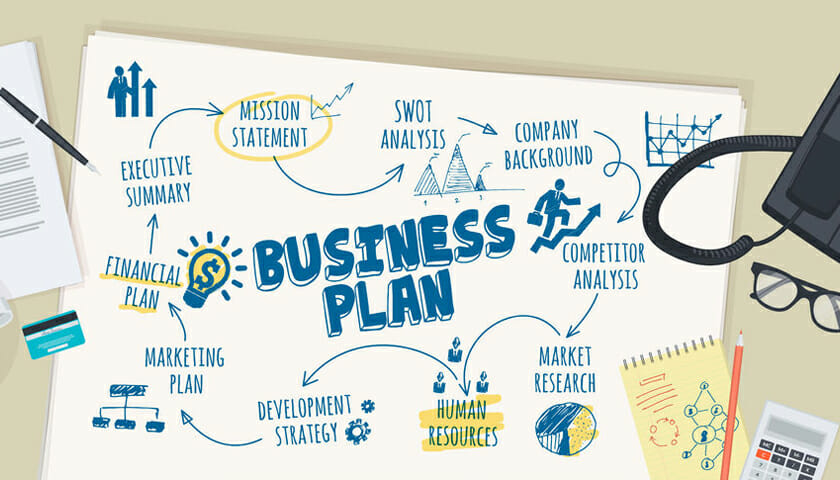Forward planning in business – if you fail to plan, you plan to fail..so create a business plan!
Planning is one of those things that we do throughout our lives, often without thinking twice about it and forward planning in business and business plans is not something that is generally given much thought.
Schools and universities help us plan and prepare for our career; we meticulously plan our wedding day to ensure everything comes off perfectly; we plan our holidays, our first step onto the property ladder and much more.
Why, then, do so many small and start-up businesses neglect to produce a business plan? It’s true that being agile and flexible is the key to staying afloat for many businesses and that any lengthy plan may be out of date before it’s put into action.
But business plans aren’t what they once were.
A new business strategy can be kept to a few pages instead of the traditional wad of documents and a presentation on the goals can take minutes, rather than a whole morning in the boardroom.
The trick is to develop a plan that keeps the company on track while still allowing some flexibility for changes of direction.
Here, we look at how to create a business plan that works for start-ups and SMEs.
Define your main goal
Defining an overarching goal is one of the first steps. To do this, it’s necessary to think about what your business is trying to achieve for a specific group of people.
Often, that involves either making life more convenient, or solving a problem for, your target audience.
Once you have determined the ‘why’ of your product or service, it should be a fairly simple step to define your overarching goal. For example, if your business is about making electric vehicles, then your primary goal – or raison d’être if you will – might be ‘A world that doesn’t rely on oil’.
Once this goal is established, all other goals should aim to support it. Each time a decision around changes in direction or new ideas comes up; you can ask yourself if it will bring you closer to your main goal.
Limit the planning timescale
We don’t mean by this that you should set yourself one hour in which to create a successful company strategy. Rather, limit the time frame of the goals you set. If your business is flexible by nature, setting a goal for three to five years’ time may not be particularly helpful. Instead, look at what can be achieved in the next year and split that into realistic aims for each quarter.
Your first year goal might be, for example, to achieve a certain amount of revenue.
The quarterly goals to get you to that point could include improving the customer experience on your website, increasing advertising in specialist press or securing funding for some research and development work.
Set Key Performance Indicators (KPIs)
Once you’ve set your goals, your business plan will enable you to assign specific projects or tasks to people in your team. Each person will be accountable for their assigned task and the use of KPIs will ensure work is staying on track.
Rather than trying to predict an outcome as a forecast might in a traditional business plan, KPIs ensure everyone working on a task understands what is expected.
That should give you plenty of notice should a problem, or indeed an opportunity, arise.
Perform a SWOT analysis
A SWOT analysis is a useful tool to include in your new business strategy as it helps to identify the current strengths and weaknesses, as well as any opportunities and threats relating to your operations.
In a start-up business plan, this might encompass notes from your market research and competitor analysis as well as identifying internal advantages and potential issues.
SMEs that performed a SWOT analysis as part of their start-up process shouldn’t simply ignore it though. Companies have to evolve to stay competitive, so it’s unlikely that the various elements of the analysis will stay the same.
For that reason, it’s worth revisiting as part of your planning.
Identifying areas for improvement, as well as those where your business is successful, can help to determine the direction you take or the aspects you focus on in the coming year.
A SWOT analysis will also enable you to identify early on the potential barriers to achieving your goals. It may be, for example, that you need to hire a new member of staff or invest in some new equipment.
Forward planning in business – outlining your financial position in your business plan
The chances are you will be creating some kind of financial forecast regardless of whether or not you usually create a business plan. Knowing your current financial position, managing your cash flow and budgeting for any required expenditure are essential elements of running a business.
It makes sense then, to include an outline of your current and expected financial positions in your business plan. It’s not necessary to go into all the details – after all, that’s what your forecast is for – but it’s useful to summarise where you are now and how much money you need to bring in over the next year.
This will give you a firm idea of how realistic your goals are and enable you to identify any financial gaps. Combined with the SWOT analysis, it can also provide a guide for where you should look to allocate budget over the coming year.
Further advice on forward planning in business and business plans
If you’re looking for further advice on business planning, help with your new business strategy, or even an in-depth audit of your company finances, contact the teams at THP today. As experienced Chartered Accountants, we can assist with the full range of corporate planning needs.
Visit one of our offices in Sutton, Chelmsford, Saffron Walden, and Wanstead or contact us via our website for more information. Whether you need help with bookkeeping and accountancy, auditing, business management or company restructures and acquisitions, we offer everything you need to take your start-up or SME forward.
About Mark Boulter
Mark Boulter is responsible for the efficient running of the firm’s infrastructure, and ensuring that THP delivers the best client service. Promoting the vision and culture across all branches, people are the key: “I like people who have a fresh approach and I’m happy for them to run with their ideas,” he says.
Communication across departments is crucial and Mark pioneers this. He ensure that people and departments not only talk to each other, but that they share ideas– whether they’re about marketing, finance, sales, strategy or any other topic that can result in us offering a better service. “I think helping to develop the next generation of THP people is essential to our success,” Mark adds. “We’ve a lot of talented people and our way of doing things increasingly attracts ambitious newcomers who are looking for a fresh approach. That’s good for us and even better news for our clients.”












